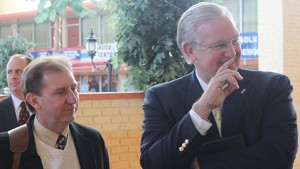By Eli Yokley
HANNIBAL, Mo. — When Democrats gathered in Hannibal to kick-off their political season this weekend, they did so with great pride in their statewide wins last year. 
The party kept hold of what was once considered the most vulnerable U.S. Senate seat in the country, the governor’s mansion, as well as the offices of secretary of state, state treasurer, and attorney general. The political common wisdom of 2012 was that Missouri Democrats were in trouble, but with a relentless focus on their “Missouri moderate” message and some helpful high profile gaffes from Republican rivals, Democrats were able to win four out of the five statewide races on the ballot last year, pulling votes from counties that have traditionally been Republican strongholds.
But in the same state, and with wins in many of those same counties, Republicans were able to keep hold of the General Assembly, and in fact win additional seats to receive the first super-majority in recent history.
Gov. Jay Nixon, who has been able to largely avoid involvement in state legislative races while serving as the de-facto head of the party, said he is optimistic about some of the candidates emerging for the upcoming cycle, but was non-committal when asked whether he would use his still-growing campaign war chest to help prop up Democratic candidates.
“I’m not going to sit here on March 1 in 2013 and go through any sort of strategy of something that might happen in November of 2014,” Nixon told reporters after speaking to supporters in Hannibal. “My strategy right now is to move Medicaid expansion forward, to get the school year lengthened, and to make sure we’re continuing to expand our exports.”
While Nixon attempts to stay out of the fray, however, other Democrats are purposefully injecting themselves into it. State Rep. Ed Schieffer used Democrat Days in Hannibal to launch his candidacy for state Senate. The district, which encompasses parts of Lincoln, Callaway, and Monroe counties, is currently represented by Jolie Justus, a Kansas City Democrat, but only because of a redistricting technicality that allowed her to keep the seat for the remainder of her term.
Schieffer, who on Saturday touted himself as a “pro-life,” “pro-gun” Democrat, instead used the opportunity to tout his pro-union bonafides, as he will likely rely on them for support in what will likely be a challenging race against Republican Rep. Jeannie Riddle.
“I’m 100 percent pro-union,” Schieffer said. “But this new Republican majority seems obsessed with attacking unions instead of finding ways to create growth and bring jobs to the state. I won’t have that problem in the Senate.”
Practically, maintaining control of state Senate seats they already hold does little to change the Democrats’ power in Jefferson City. What is likely more effective is dampening the Republican majority in the House. Currently the party has 109 members of the caucus — the exact number required to override a gubernatorial veto. If they lose even one seat during 2014, Nixon would regain control of a strong veto pen.
Democrats believe they could be competitive in districts like the 14th against Ronald Schieber, the 29th against Noel Torpey, in the 44th against Caleb Rowden, in the open 90th, in the 97th against John McCaherty, the 112th against Paul Wieland, the 115th against Elaine Gannon, and even possibly in the 116th against Kevin Engler. Additionally, Democrats believe they are incredibly competitive in the upcoming special election in the 157th district to replace Don Ruzicka. Mike Moon, a conservative farmer from the Mt. Vernon area, is facing Charles Dake, a veterinarian who won a special election in 2006.
Scott Dieckhaus, executive director of the Missouri House Republican Campaign Committee, was in southwest Missouri over the weekend campaigning for Moon. He believes the district leans far more in the Republican’s favor than it did during the special election in 2006, but said the party is not taking any chances and will give it a special focus heading in to June.
Speaking more broadly, Dieckhaus ceded that Republicans will probably not maintain the super-majority through the next election because of a handful of challenging seats.
“It is tough,” he said. “It is called a super-majority for a reason.”
Dieckhaus said Republicans are eying the seats being vacated by Schieffer and Rep. Jeff Roorda, who also announced a senate candidacy over the weekend. Republicans also believe they will be competitive in the district currently held by Rep. Steve Hodges in southeast Missouri.
“We’re just now beginning the process of breaking down the districts and narrowing our 2014 targets, but there are clearly some pick-up opportunities for Democrats – particularly if you look at how well a statewide candidate like Gov. Nixon performed in some of these areas,” Joe Duffy, executive director of the Missouri Democratic Party, said.






